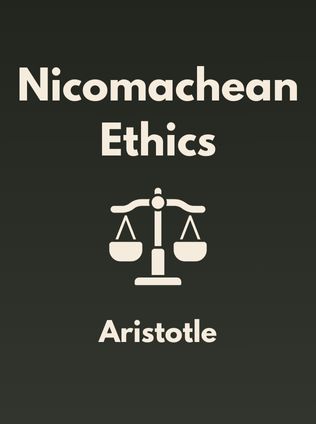
About the Author
Aristotle, one of the greatest philosophers of ancient Greece, was born in 384 BCE in Stagira, a small town in northern Greece. A student of Plato and the teacher of Alexander the Great, Aristotle’s influence on Western thought is profound and enduring. He wrote on a diverse range of subjects including metaphysics, logic, ethics, politics, biology, and rhetoric. His works laid the foundation for much of Western philosophy and science, and his ideas remain a vital part of contemporary philosophical discourse.
Among his many works, the Nicomachean Ethics stands out as a cornerstone of ethical philosophy. Named after his son, Nicomachus, or possibly his father, the text explores the nature of human happiness and the means by which individuals can achieve a good and fulfilling life. Aristotle's ethical theory is rooted in the concept of virtue and emphasizes the importance of reason in human life. His approach to ethics is practical, focusing not merely on abstract principles but on how individuals can cultivate virtues and live well in everyday life.
Main Idea
The central theme of Aristotle's Nicomachean Ethics is the exploration of the best possible way a person can live. Rather than offering a set of rules for specific situations, Aristotle provides a general framework for understanding what constitutes a good life and how it can be achieved. At the heart of this framework is the concept of eudaimonia, often translated as "happiness" or "flourishing." Aristotle argues that happiness is the ultimate goal of human life, the end toward which all our actions aim.
Aristotle's ethical philosophy is built on the idea that a good life is one lived in accordance with virtue. He distinguishes between moral virtues, which govern our interactions with others, and intellectual virtues, which pertain to knowledge and understanding. For Aristotle, the highest form of virtue is wisdom, and the most fulfilling life is one that balances moral and intellectual virtues through rational activity. This life of virtue, Aristotle argues, leads to true happiness.
Table of Contents
- Defining a Good Life
- The Goal of Human Life
- Defining Happiness
- Becoming Morally Virtuous
- Defining Moral Virtue
- Developing Moral Virtue
- Becoming Intellectually Virtuous
- Wisdom as the Highest Virtue
- The Happiest Human Life
Defining a Good Life
The Goal of Human Life
Aristotle begins his inquiry by asserting that the ultimate goal of human life is happiness. He examines the nature of human actions and concludes that all actions aim at some perceived good. However, these goods exist in a hierarchy, with some serving as means to others. At the top of this hierarchy is the ultimate good, which Aristotle identifies as happiness. He argues that happiness is the only thing we desire for its own sake, whereas other goods are pursued because they contribute to happiness.
"Happiness, then, is something final and self-sufficient, and is the end of action." - Aristotle
To illustrate this, consider a series of actions in daily life:
Sign up for FREE and get access to 1,400+ books summaries.
You May Also Like
The Subtle Art of Not Giving a F*ck
A Counterintuitive Approach to Living a Good Life
By Mark MansonRich Dad Poor Dad
What the Rich Teach Their Kids About Money - That the Poor and Middle Class Do Not!
By Robert T. KiyosakiHow To Win Friends and Influence People
The All-Time Classic Manual Of People Skills
By Dale CarnegieFreakonomics
A Rogue Economist Explores the Hidden Side of Everything
By Steven D. Levitt and Stephen J. Dubner



















